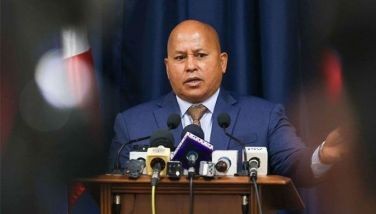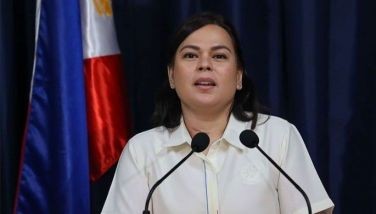Government urged to identify landslide-prone areas
February 20, 2006 | 12:00am
Two congressmen urged concerned government agencies yesterday to identify landslide and disaster-prone areas throughout the country to prevent a catastrophe similar to the one that obliterated Barangay Ginsaugon in St. Bernard, Southern Leyte last Friday.
Representatives Eduardo Zialcita of Parañaque City and Antonio Cuenco of Cebu City said the Mines and Geosciences Bureau (MGB) and other agencies should come up with and publish a list of areas that could be hit by landslides, mudslides and flooding.
In fact, they said MGB has reportedly drawn up in 2004 a map showing areas in the country that could be susceptible to landslides.
With further verification and coordination with other agencies and local government units, the bureau should update its map and furnish the concerned authorities, they said.
They added that the publication of a list of landslide-prone areas is in line with President Arroyo’s call for vigilance against a Ginsaugon-type of tragedy.
Zialcita and Cuenco pointed out that the disclosure of the list would be a forewarning to local government officials and residents of the affected areas of an imminent disaster. They suggested that a disaster map should be out before the onset of La Niña, which is expected to begin in April or May, much earlier than the rainy season.
They said the other agencies that could be tapped for inputs include Pagasa, the weather-forecasting office, and the National Mapping and Resource Information Administration or Namria.
On Friday, trees, rocks and mud let loose by several days of rain buried Ginsaugon and an estimated 1,500 to 2,000 residents, including schoolchildren. The disaster is reminiscent of the Ormoc floods and mudslides in 1991, which killed about 5,000 people, and the Aurora and Quezon flooding and landslides in December 2004. The disasters have been blamed on both legal and illegal logging. Despite such catastrophes, the government has again allowed logging operations in Aurora and Quezon and in Samar.
Zialcita said there should be proper information dissemination of all matters pertaining to potential landslides and other disasters. "A publication of all areas that are vulnerable to landslides should be the first step in educating and forewarning our people. This must be done before the expected onslaught of La Niña this summer." Zialcita also called on the MGB to ask its regional and provincial directors to distribute landslide-susceptibility maps to all LGUs, which are the forefront of protecting residents and helping them during calamities and disasters. "The MGB must update us on how they have conducted their information dissemination for their landslide susceptibility map," said Zialcita.
Cuenco said the publication of the list of all disaster-prone areas in the country will enable LGUs to adequately prepare and implement their contingency planning for local residents. "We can prevent tragedies and protect more lives if we know which high-risk areas must be avoided by the people."
Cuenco said there should be closer coordination between LGUs and the Department of Environment and Natural Resources on the aspect of identifying the risk areas in barangays, towns, cities and provinces. "Following the President’s call for more vigilance of people in high-risk areas, we call on the MGB, DENR and LGUs to work closely so the people can be adequately informed and prepared for any contingency."
Representatives Eduardo Zialcita of Parañaque City and Antonio Cuenco of Cebu City said the Mines and Geosciences Bureau (MGB) and other agencies should come up with and publish a list of areas that could be hit by landslides, mudslides and flooding.
In fact, they said MGB has reportedly drawn up in 2004 a map showing areas in the country that could be susceptible to landslides.
With further verification and coordination with other agencies and local government units, the bureau should update its map and furnish the concerned authorities, they said.
They added that the publication of a list of landslide-prone areas is in line with President Arroyo’s call for vigilance against a Ginsaugon-type of tragedy.
Zialcita and Cuenco pointed out that the disclosure of the list would be a forewarning to local government officials and residents of the affected areas of an imminent disaster. They suggested that a disaster map should be out before the onset of La Niña, which is expected to begin in April or May, much earlier than the rainy season.
They said the other agencies that could be tapped for inputs include Pagasa, the weather-forecasting office, and the National Mapping and Resource Information Administration or Namria.
On Friday, trees, rocks and mud let loose by several days of rain buried Ginsaugon and an estimated 1,500 to 2,000 residents, including schoolchildren. The disaster is reminiscent of the Ormoc floods and mudslides in 1991, which killed about 5,000 people, and the Aurora and Quezon flooding and landslides in December 2004. The disasters have been blamed on both legal and illegal logging. Despite such catastrophes, the government has again allowed logging operations in Aurora and Quezon and in Samar.
Zialcita said there should be proper information dissemination of all matters pertaining to potential landslides and other disasters. "A publication of all areas that are vulnerable to landslides should be the first step in educating and forewarning our people. This must be done before the expected onslaught of La Niña this summer." Zialcita also called on the MGB to ask its regional and provincial directors to distribute landslide-susceptibility maps to all LGUs, which are the forefront of protecting residents and helping them during calamities and disasters. "The MGB must update us on how they have conducted their information dissemination for their landslide susceptibility map," said Zialcita.
Cuenco said the publication of the list of all disaster-prone areas in the country will enable LGUs to adequately prepare and implement their contingency planning for local residents. "We can prevent tragedies and protect more lives if we know which high-risk areas must be avoided by the people."
Cuenco said there should be closer coordination between LGUs and the Department of Environment and Natural Resources on the aspect of identifying the risk areas in barangays, towns, cities and provinces. "Following the President’s call for more vigilance of people in high-risk areas, we call on the MGB, DENR and LGUs to work closely so the people can be adequately informed and prepared for any contingency."
BrandSpace Articles
<
>
- Latest
- Trending
Trending
Latest
Trending
Latest
Recommended





























